
|
May 23, 2015 - No. 21 Canada's
Economic Existential Crisis Incessant Decline in Manufacturing   Workers in fisheries, mining and metallurgy, and forestry demand that governments defend the public interest and oppose nation-wrecking by the monopolies. • The Necessity for a New
Direction
for International Trade
Intermonopoly Fight Over Federal-Provincial Power Sharing • Quebec Premier's Speech to the Ontario Legislature: A Central Alliance -- For What? - Louis Lang - Aberration of Due Process in Nova Scotia • Murky Affair of Accused British Royal Navy Sailors Gets Murkier - Tony Seed - Harper Dictatorship's Vitriolic Hatred of Communism • Antipathy to Canada's Institutions Continues to Rouse Opposition - Sam Heaton - • Ottawa-Centre MP Raises Questions About Monument Approval Procedure • Revelations of Government's Manipulation of National Capital Commission • Government's Reluctance to Bring Suspected Nazis to Justice International News and Commentary • New Ukrainian Anti-Communist Laws Honour Nazis • Former German Democratic Republic Generals Issue Warning • U.S. Military Out of Japan -- Mass Rally in Okinawa Demonstrates Anti-War Sentiment of the People 35th Anniversary of People's Uprising in Gwangju, Korea • Gwangju and the Fight for Democracy, Reunification and Freedom from U.S. Occupation • Firm Stand Against Provocations by U.S. Secretary of State • Obama's Maxim - DPRK Permanent Mission to UN - Supplement World War Two History • Anglo-American and German Capital Behind the Nazi War Machine Canada's Economic Existential Crisis Incessant Decline in ManufacturingTML Weekly is posting below Part Three in the series "Canada's Economic Existential Crisis" by K.C. Adams. For Part One in the series, "Problems in the Manufacturing Sector," see TML Weekly, March 28, 2015 - No. 13. For Part Two, "What Statistics Canada Says About the Downturn in Canadian Manufacturing from 1998 to 2008," see the TML Weekly Supplement, April 25, 2015 - No. 17. ***No modern economy can survive without an internal manufacturing base producing means of production and articles of consumption. Lacking a manufacturing base puts an economy in an existential crisis dependent on external forces beyond the control of the people.
In addition to providing products as use-value, workers in manufacturing produce essential exchange-value necessary for the internal realization of value produced in other sectors, especially the service sectors and the country's social and material infrastructure. Natural resource extraction and export can generate wealth but the value and stability are dependent upon external factors such as the international market price for oil and other raw material. To have a human-centred independent economy with all-sided manufacturing, public services, social and material infrastructure, and construction and resource sectors requires political and economic power in the hands of Canadians. They must have the political power necessary to deprive the global monopolies of the power to deprive Canadians from building an independent all-sided economy with manufacturing and service sectors as the base. In the absence of this political power as is now the case, Canada faces an existential crisis. Monopoly Right Is Destroying the Manufacturing Base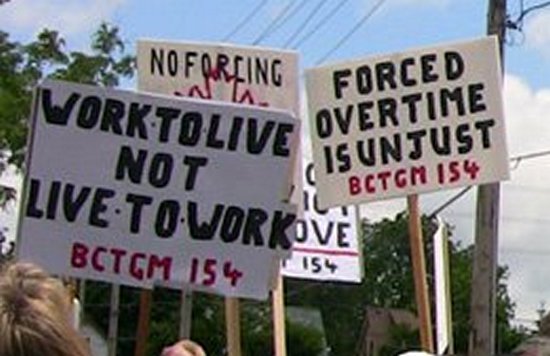  Lockouts at Kellogg's in London, 2009 and U.S. Steel in Hamilton, 2010. After the companies attacked the workers for concessions, both operations ceased manufacturing. Post-war employment in manufacturing reached its peak in the 1970s. Manufacturing as a prominent sector in Canada arose in large measure not to meet the needs of an independent economy but as an offshoot of British colonial competition with U.S. imperialism. This explains in part why the Canadian economy was so vulnerable to U.S. penetration after WWII. With the rise in strength of post-war U.S. imperialism and relative decline of British imperialism, British colonial control of Canada for its own interests and as a bulwark against U.S. continentalism weakened. A new arrangement emerged in the 1960s based on U.S. imperialist expansion. The 1965 Canada/U.S. Auto Pact is an example.
Before the Auto Pact, only three per cent of vehicles sold in Canada were assembled in the United States. In 1964, only seven per cent of vehicles assembled in Canada were sent south of the border, but by 1968, the figure was sixty per cent. By the same date, 40 per cent of cars purchased in Canada were assembled in the United States. From 1965 to 1982, Canada had a surplus of around $28 billion worth of assembled vehicles but a deficit of around $40.5 billion in auto parts.
The Auto Pact was prepared and written by officials of the U.S. auto monopolies General Motors, Ford, and Chrysler to strengthen their respective empires. One effect of the agreement was to change the focus of standards away from Europe towards the United States. In the early 1970s, Transport Canada adopted the technical regulations of the U.S. National Highway Traffic Safety Administration rather than participating in the European-based development of international consensus on auto safety and emissions regulations.
The trend towards giving U.S.-led monopolies open access to Canada continued throughout the period. A global economic crisis struck in the mid-1970s, with interest rates rising to 20 per cent. Economic production plummeted, unemployment increased accompanied with widespread bankruptcies. Beset with crisis, the U.S.-led monopolies forced their way into new regions and countries around the world. A radical reorganization within the imperialist system of states ensued centred on free trade and negative changes in the relations of production with the working class beginning a long decline in wages and working conditions and destruction of social programs and public services. Extensive neo-liberal propaganda said attacks on the rights of the working class and implementation of monopoly-controlled free trade negating sovereign rights were the answers to the crisis, and specifically, to make U.S.-led monopolies dominant in world markets.
Canada was soon subsumed within a U.S./Canada Free Trade Agreement implemented in 1989 and the even more extensive North American Free Trade Agreement (NAFTA) in 1994. NAFTA strengthened the march towards a United States of North American Monopolies where the private interests of the most dominant monopolies dictate economic, political, and social and public policy in their own narrow private interests.
The economy has become dependent on the U.S. buying Canada's raw materials and supplying social wealth for economic development. When this does not materialize, the lives of the working people suffer, business stagnates, social programs and public services are slashed, public authority is undermined, predatory wars abroad and repression at home escalate, schemes to funnel public funds to the rich proliferate and democratic reform is blocked.
The Canadian nation-state created in part to foil annexation into the U.S. Empire and which gradually evolved into a social democratic state with a robust public authority has been destroyed on the altar of finance capital and its politicized private interests.
The Canadian working class has the heavy social responsibility to lead the country out of its existential crisis. In broad terms, the working class must constitute itself the nation and vest sovereignty in the people, and open a path in a new direction towards a self-reliant pro-social economy that can guarantee the well-being and security of all. (With files from Statistics Canada, CBC, Globe and Mail, Wikipedia)
The Necessity for a New Direction for
|
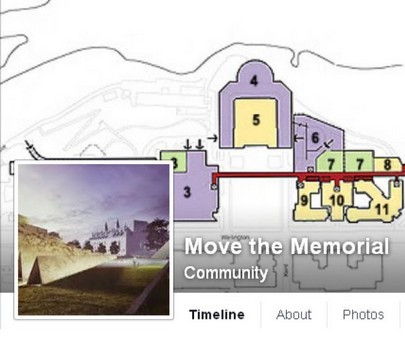 A Facebook page has been set up calling for the moving of the monument, as well as a petition on change.org. |
Dewar wrote, "As you know, this public land had for decades been slated for a new federal judicial building (FJB) that was to consolidate the Federal Court of Appeal, the Federal Court and the Tax Court of Canada, as part of the Long Term Vision and Plan (LTVP) for the Parliamentary and Judicial Precincts. This intended use for the site was confirmed in 1987, and reiterated when all stakeholders, including Parliament through the Board of Internal Economy (BoIE), endorsed the 2006 PWGSC Parliamentary and Judicial Precincts Site Capacity and Long Term Development Plan -- Plan Update."
Referring to Public Works' failure to revise the long-term plan to accommodate the anti-communist monument, Dewar asked whether the Board continues to endorse the long-term plan, and if it was discussed. He requested clarification as to whether the BoIE would have to review and approve any amendment to the long-term plan before final review and approval of the memorial. Dewar sought further clarification on a number of matters with regards to the procedure for the government to follow in order to realize its monument:
"Does the BoIE agree that any significant or substantive amendment to the LTVP should follow proper and thorough consultation with all stakeholders involved in developing the 2006 LTVP? I have enclosed for your reference a copy of page 121 of the 2006 report entitled The Parliamentary and Judicial Precincts Site Capacity and Long Term Development Plan (Plan update 2006), which lists the stakeholders consulted in the development of the LTVP.
"Does the BoIE accept the judgment of the NCC that the LTVP must be formally amended prior to constructing the Memorial in its proposed location at the heart of the Judicial Precinct?
"Based on the estimated cost of the planned FJB and standard architectural and engineering fees, is the BoIE concerned about the potential loss of approximately 13 million dollars of taxpayer revenues on the plans for the [new federal judicial building]? If you have more precise cost details for the work to date on the FJB, please provide that information too.
"Does the BoIE possess a full account of buried infrastructure associated with the Cliff Street Heating Plant that would be affected by the Memorial Monument, and any additional costs? If so, does the BoIE find such costs proportional to the costs of the Memorial, or commensurate with the costs of a federal courthouse?
"Does the BoIE consider the Judicial Precinct to be equal to the Parliamentary Precinct in terms of symbolic and representational value? If so, would the BoIE support a solution that places the Memorial in a prominent location on Confederation Boulevard without compromising the existing planned location for a new federal courthouse?"
Revelations of Government's Manipulation of
National Capital
Commission
The National Capital Commission (NCC) first expressed support for a memorial similar to that advocated by Tribute to Liberty in September 2009. It did so only after nearly all its board members expressed opposition to the concept of a memorial to the "victims of communism," saying instead it should commemorate victims of oppressive regimes. Board members pointed out that such a memorial would be "unduly critical" of Canadian communists and inappropriate as Canada has a federally-registered Communist Party. Tribute to Liberty, which said at the time that it would fund the monument through private donations, refused to accept this proposal and the NCC eventually agreed to a "Monument to Victims of Totalitarian Communism: Canada, A Land of Refuge." The word "totalitarian" was dropped after a "mandate letter" to the NCC from John Baird in 2012 called for the change. One source told the Ottawa Citizen that the change was made because "the word totalitarian implied that some forms of communism were acceptable."
Documents obtained in 2015 by the Citizen under access to information requests reveal that NCC bodies determined early on that a monument to the "victims of communism" did not meet its own policy regarding such memorials in the capital. The commission's External Committee of Experts, meeting in February 2009, unanimously agreed that the monument was not appropriate, noting that "the purpose could be misconstrued as political rather than commemorative in nature." In September 2009, an NCC staff report acknowledged that the monument "remains not entirely compatible with the NCC's policy..." though it recommended approval.
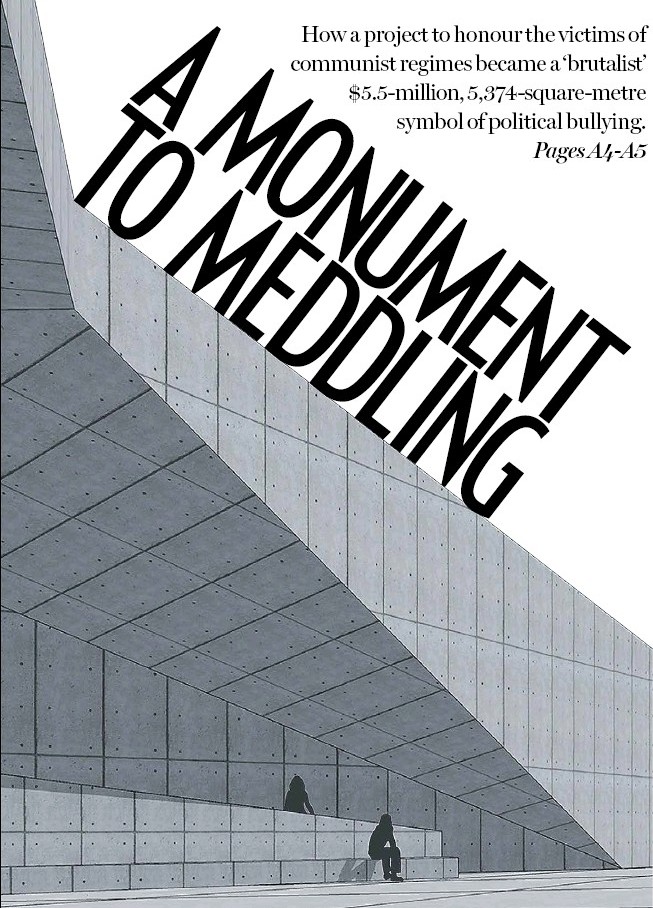 Even the National Post is critical of the Harper government's attempts to impose the anti-communist monument, as shown in this graphic from March 2015. Click to enlarge. |
By summer 2010, the NCC allocated a site at the Garden of the Provinces on Wellington Steet, not far from the Supreme Court and the presently-proposed location. How the original site came to be abandoned in favour of what is known as the judicial precinct is another black hole. Jason Kenney "said last week he had no idea how the memorial ended up being moved next to the Supreme Court of Canada," wrote Ottawa Citizen journalist Joanne Chianello on May 20. On March 6, Citizen reporter Don Butler reported that the Supreme Court site was first chosen by the government in May 2012, citing sources who said the decision was made by John Baird, then the minister responsible for the NCC.
The NCC did not learn about the new site until March 2013 when the government's Public Works Department sent a letter requesting approval to use the grounds for the monument. The judicial precinct did not appear on the NCC's list of sites for future monuments and memorials. Despite disagreeing with the decision, the NCC board approved the site in September 2013. If they had refused to do so, the federal cabinet could have bypassed the NCC and made the change unilaterally.
The site was first announced to the public alongside $1.5 million in federal funding for the monument, an offer later doubled to $3 million after it became clear the project had no support from Canadians and could not raise funds on its own. The official estimate of the project's cost has since been raised to $5.5 million, while experts say it is likely to amount to three times as much.
The government handed over the NCC's responsibilities for commemorations to Heritage Canada in September 2013, limiting its ability to influence any aspect of the project.
The NCC continued to bring its concerns to the government in 2013 and 2014. Documents obtained by the Citizen show that in 2013 the commission's advisory committee on planning, design and realty tried and failed to ensure that the government refer to the judicial precinct location as the "intended site," given that it did not have the authority to use it according to the long-term plan. At its February 2014 meeting, the NCC committee continued to insist that such a monument should not target communism, but oppression. The committee reiterated that using the proposed site for the monument contradicts the official plan for the land's use.
The chair of the NCC's advisory committee on planning and design, Larry Beasley, told Maclean's magazine on January 9 that his committee disapproved of both the proposed site and the monument's design. The winning design was selected in August 2014 after a seven-member jury gave recommendations. At least one jury member, an architect, spoke out against the design and the location after the fact. "It is so centrally placed that it would seem to quite overshadow Canada's true history... I think it completely misrepresents and skews what Canada is all about," she said.
Government's Reluctance to Bring
Suspected Nazis to Justice
A member of the Ukrainian battalion of the Waffen SS has been living in Quebec for the past 60 years, a May 9 article by Steven Chase in the Globe and Mail reveals. The story has come to the fore because the Investigative Committee of the Russian Federation called on Canada to deliver Vladimir Katriuk, currently a Quebec beekeeper in his 90s, to Moscow so he can be tried for alleged war crimes.
Given the seriousness of his alleged war crimes "and the fact that his accomplices were proven guilty and faced the death penalty for exterminating civilians of the Khatyn village in Byelorussia, an extradition request would be logical for bringing the Nazi collaborator to court," Kirill Kalinin, second secretary of the Russian embassy's political section, said in a statement.
Jewish groups have long urged the deportation of Katriuk, the Globe article says, adding that "they increased their demands for action in recent years after new scholarly research that appears to tie him to a 1943 massacre of villagers in Belarus, a former Soviet republic."
In 1999, the Federal Court ruled that Katriuk had obtained Canadian citizenship under false pretenses by not telling authorities about his collaboration with the Nazis but could find no evidence he had committed atrocities. In 2007, the Harper cabinet decided not to revoke his citizenship.
According to the Globe article, "In 2015, the Simon Wiesenthal Center's Annual Nazi War Criminals Report ranked Mr. Katriuk second on the list."
When the extradition request was made, "the Harper government refused to address the request and instead immediately shifted the topic back to Russia's aggression in Ukraine," the Globe writes.
"While I cannot comment on any specific extradition request, to be clear, we will never accept or recognize the Russian annexation of Crimea or the illegal occupation of any sovereign Ukrainian territory," said Clarissa Lamb, press secretary for Justice Minister Peter MacKay.
"In 2012, the Harper government reportedly pledged to re-examine the Katriuk case but on Friday [May 8] Mr. MacKay's office would say nothing about this, citing privacy law. Ms. Lamb said options for war-crimes cases 'include extradition, criminal prosecution in Canada under the Crimes Against Humanity and War Crimes Act, revocation of Canadian citizenship, deportation, and surrender to an international tribunal.'
"Mr. Katriuk has said he was forced to join the SS battalion and did not participate in operations with the Germans. He said that while in Belarus, he guarded villagers, livestock and resources from other partisan forces."
The Harper government's reluctance to either extradite or prosecute an alleged war criminal is consistent with its virulent anti-communism and attempts to rehabilitate Nazis and their collaborators, such as with its planned "Memorial to the Victims of Communism" in Ottawa.
International News and Commentary
New Ukrainian Anti-Communist Laws Honour Nazis

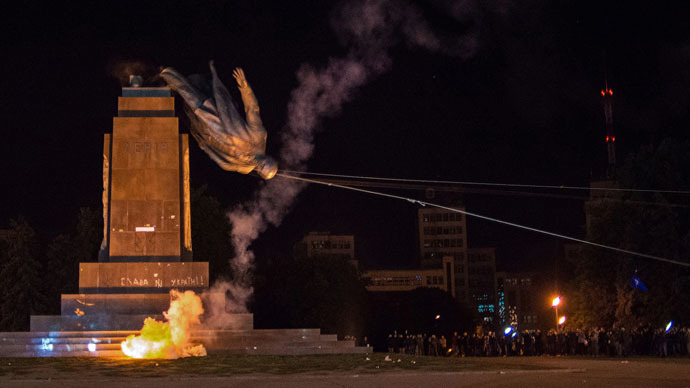
Left: monument to fascist and Nazi collaborator that stands in Lviv, Ukraine. Right: a statue
of V.I. Lenin in Kharkov, Ukraine is brought down, September 28, 2014. (RIAN)
On May 15, a bill honouring organizations that collaborated with the Nazis in World War Two, including carrying out massacres of Jewish and Polish people, was signed into law by Ukrainian President Petro Poroshenko, having been passed April 9 by Ukraine's parliament, the Supreme Rada. The law specifically honours the Organization of Ukrainian Nationalists (OUN) and the Ukrainian Insurgent Army (UPA). Also signed into law that day was another bill outlawing communist and Nazi symbols, that targets communism by equating it with Nazism.
According to Ukrainian website zik.ua, the law honouring the Nazi collaborators states in part, "The state acknowledges that the fighters for Ukraine's independence played an important role in reinstating the country's statehood declared on Aug. 24, 1991.
"In compliance with the law, the government will provide social guarantees and bestow honors on OUN-UPA fighters.
"Public denunciation of the role of OUN-UPA in restoring the independence of Ukraine is illegal."
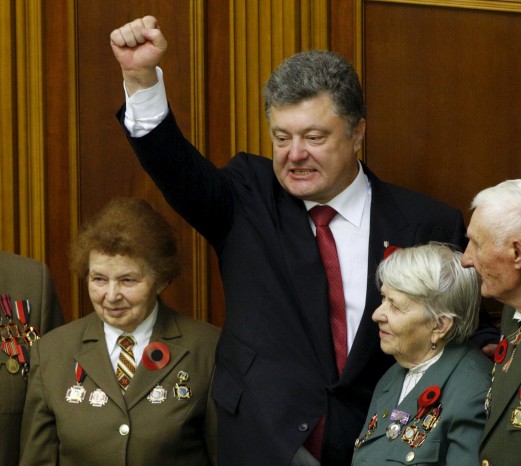 Ukrainian President Poroshenko pays tribute to veterans of the fascist UPA, Kiev, May 8, 2015. |
The extreme right nationalists and neo-Nazis currently in power in Kiev portray the OUN, founded in 1929, as a "revolutionary" or "partisan" organization that sought to "liberate" Ukraine from Soviet rule. Josh Cohen, writing for Reuters, points out, "Many OUN leaders were trained in Nazi Germany, and the group's philosophy was influenced by Nazi racial theorists such as Alfred Rosenberg. OUN literature, for example, declared the need to 'combat Jews as supporters of the Muscovite-Bolshevik regime... Death to the Muscovite-Jewish commune! Beat the commune, save Ukraine!'"
"Starting with a pogrom in Lviv shortly after the Nazis invaded the Soviet Union," Cohen writes, "OUN militias -- with the support of the Nazis -- embarked on a killing spree in Western Ukraine that claimed the lives of tens of thousands of Jews. After the Nazis dissolved these militias, many of their members joined the Ukrainian Auxiliary Police in German service, where they received weapons-training and became one of the most important instruments of the Holocaust in Belarus and Western Ukraine.
"By 1943 the OUN had seized control of the Ukrainian Insurgent Army (UPA), a Ukrainian nationalist paramilitary group, and declared itself opposed to both the retreating Germans and the oncoming Soviets. Although no longer in Nazi service, the UPA nevertheless continued to target and kill Jews, herding them into labor camps for execution. The UPA also engaged in the mass ethnic cleansing of Poles during this time, killing nearly 100,000 people."
Ukrainian President Petro Poroshenko Signs Four Laws
Four new laws that Ukrainian President Poroshenko has signed criminalize public denial of Nazi atrocities and put the Nazis and the Soviets on par as a manoevre to get those who collaborated with the Nazis portrayed as freedom fighters while permitting the falsification of history as concerns the role the Soviets played in liberating Europe by outlawing Soviet-era symbols, except for certain educational and scientific purposes. As the Poroshenko regime integrates neo-Nazi battalions into the regular armed fores, the new legislation also allegedly prohibits Nazi symbolism, opens up the secret service archives from the Soviet era and forbids the denial of Ukrainian nationalists' fight for "independence" during World War II. It blames the Soviets for stigmatizing the so-called nationalists who collaborated with the Nazis.
Soviet emblems will be removed from buildings, and streets and even cities bearing the names of Soviet-era figures will be changed, a process that will cost some 5 billion hryvnas ($240 million) during the next six months, according to Oleksandr Klymenko, Ukraine's former minister of Revenue and Duties, who criticized the move.
According to news reports, individuals found guilty of violating the ban on Communist and Nazi symbols will face up to five years behind bars. Organizations, including media outlets, can be shut down or face criminal charges that carry up to 10 years in prison.
The Organization for Security and Co-operation in Europe (OSCE) representative for media freedom, Dunja Mijatovic, warned in a statement that the new legislation, which she said was formulated in "broadly and vaguely defined language," could "easily lead to suppression of political, provocative and critical speech, especially in the media." For their part, Russian analysts point out that the issue of de-communization had not been high on the Ukrainian political agenda before the outbreak of the current political and international crisis in 2014.
Ukraine's conflict with Russia over the latter's reincorporation of Crimea into its territory last March and its alleged support for pro-Russian rebels in eastern Ukraine has precipitated a process that took place much earlier in some other former Soviet republics.
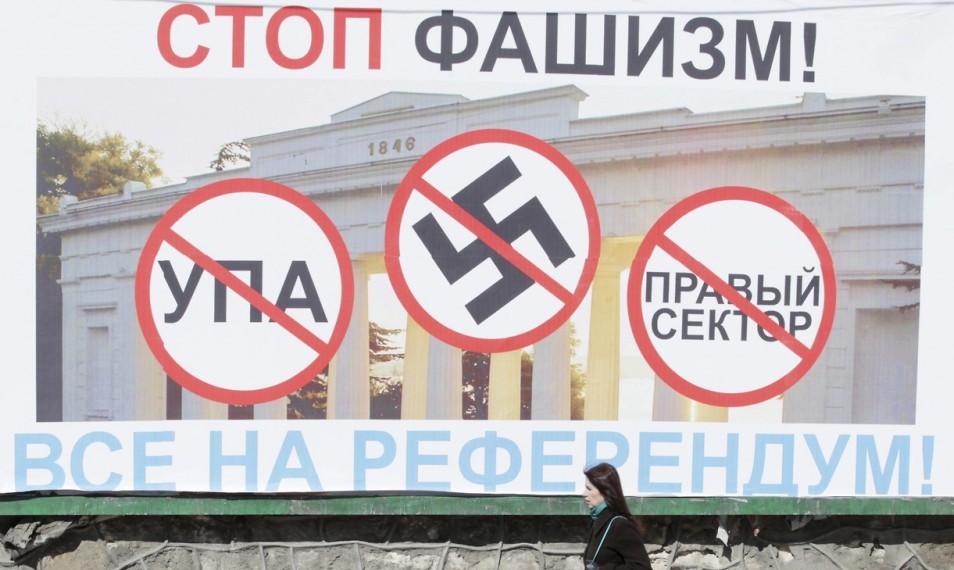 Billboard from March 2014 referendum in Crimea opposes fascism and demands that the Ukrainian Insurgent Army and Right Sector be banned. |
"In recent decades, Ukrainian authorities, for the most part, had been on board with Russia and its shared history with Ukraine," Alexei Makarkin, deputy director at the Moscow-based Center for Political Technologies think tank said. "But now that Ukraine has essentially lost Crimea and a chunk of the east, it is easier to begin. [De-communization] unites those who blame Russia for the crisis. It would have been more difficult to support prior to these major changes in the country's political landscape."
Russian Culture Minister Vladimir Medinsky wrote a letter to Gennady Zyuganov, the longtime head of the country's Communist Party, in which he pledged to protect Communist-era monuments. Zyuganov had appealed to the minister in an open letter over the destruction of Lenin monuments in Ukraine, which he said demonstrated confusion between anti-Soviet sentiment and Russophobia. Medinsky's letter, Izvestia reports, reads:
"Our position is that evidence of the Soviet era should be preserved to remind us of the power of the human spirit, the military heroism and labor of our predecessors.
"This is the only way we can achieve the historical and cultural continuity necessary for the future of Russia. Lenin statues are certainly a part of our historical identity and the Culture Ministry will do everything in its power to preserve them."
There are still some 6,000 statues of Lenin throughout Russia, according to Izvestia.
Efforts to eradicate or glorify historical periods for political purposes are merely an attempt to compensate for leaders' inabilities to address pressing social and economic issues, said Viktor Mironenko, head of the Ukrainian Studies Center at the Russian Academy of Sciences' European Institute.
"The Ukraine crisis has led both Russian and Ukrainian authorities to foster a simplified form of nationalism in which there is very little room for nuance," he said.
The de-communization of other post-Soviet states, including the Baltic states -- Estonia, Latvia and Lithuania -- has been more abrupt than that of Ukraine. All three states have banned the public demonstration of Soviet symbols, though they continue to be proudly displayed on public holidays and at memorial events. These countries also took pains to eliminate and bar from their governments and security services those who had been a part of governance in the former Soviet socialist republics.
Alexander Bruter, a scholar at the Institute for Humanities and Political Studies in Moscow, claims that the Baltic states' decisive rejection of their Soviet past helped the countries be recognized in the West and eventually facilitated their accession to the European Union in 2004.
According to news reports, a law was submitted to Latvia's parliament last week that would outlaw the public display of St. George's ribbon -- the victory banner which symbolizes the defeat of fascism in Europe. The forces promoting the revanchism of the Nazi forces are promoting the views that the St. George ribbon should be banned because it is allegedly synonymous with Russian territorial expansion.
(Sputnik International, Reuters, zik.ua)
Former German Democratic Republic Generals
Issue Warning
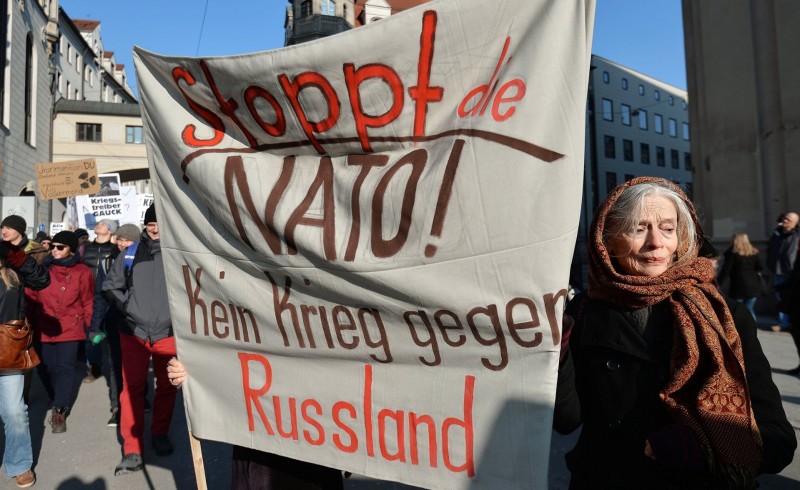
Protest at NATO policy meeting in Munich, February 7, 2015. Banner reads:
"Stop NATO! No War Against Russia."
Soldiers for Peace
As military personnel who held responsible positions in the German Democratic Republic (GDR) armed forces, we have turned to the German public in great concern over the maintenance of peace and the survival of civilization in Europe.
In the years of the Cold War, in which we lived through long stretches of confrontation and militarization right up to the brink of open conflict, we employed our military expertise to maintain peace and protect our socialist GDR. The National People's Army (NVA) was not involved in armed conflict for even a single day, and in the events of 1989-90 it played a leading role in seeing to it that no arms came into use. Peace was always the number one maxim of our dealings. And that is why we firmly oppose using the military as a policy instrument. Experience makes clear that the burning questions of our time must not be solved by military means.
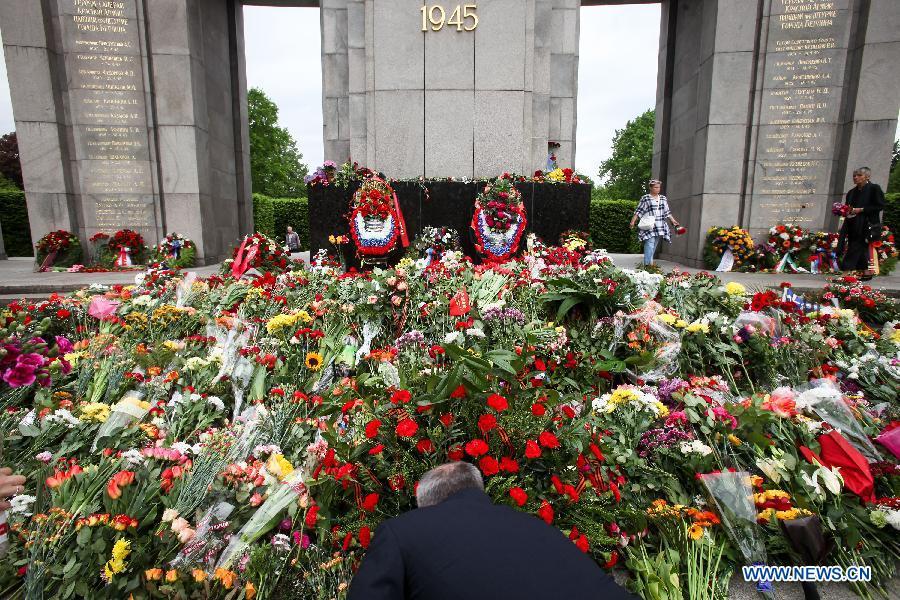 Flowers at Soviet War Memorial at the Tiergarten in Berlin, May 8, 2015. |
It is worth remembering that the Soviet Army bore the brunt of the fascist offensive in the Second World War. From the Soviet Union alone 27 million citizens gave their lives for this historic victory. We owe them, and the allies, our gratitude here on this 70th anniversary of the liberation (of Europe from fascism).
We note that war has again become humanity's constant companion. The new world order run by the U.S. and its allies has in recent times led to wars in Yugoslavia, Afghanistan, Iraq, Yemen, Sudan, Libya and Somalia. About two million people are victims of these wars, and millions have become refugees.
Now the events of war have reached Europe. It is plain to see that the U.S. strategy is to eliminate Russia as a competitor and to weaken the EU. In recent years NATO has crept ever closer to Russia's borders. With the attempt to have Ukraine join the EU and NATO, the cordon sanitaire would be locked in from the Baltic states to the Black Sea to isolate Russia from the rest of Europe. According to American calculations, any German-Russian alliance would be difficult or impossible.
In order to influence the public in this direction, an unprecedented media campaign is in full swing, where incorrigible politicians and corrupt journalists beat the drums of war. The Federal Republic of Germany, in this heated-up atmosphere, ought to be playing a role for the advancement of peace. Germany's geopolitical placement and its historical experience and the objective interests of her people all demand this, contrary to the president's calls for greater military responsibility, and the war hysteria and russophobia stirred up by the media.
Putting the spurs to the militarization of eastern Europe is not playing with fire, it is playing with war!
Knowing the destructive nature of modern war and to fulfil our responsibilities as citizens, we say with total clarity: A crime against humanity is already beginning here.
Are the many who died in the Second World War, the huge destruction throughout all of Europe, the streams of refugees and the endless sorrow of humanity forgotten already? Have the newest U.S. and NATO wars not brought enough grief? Have they not already taken enough human life?
Do we not understand what a military conflict in the densely populated continent of Europe would mean?
There would be warplanes in their hundreds, armed drones laden with bombs and rockets, thousands of tanks and armored vehicles, artillery systems. In the North Sea, the Baltic Sea, the Black Sea the most modern warships would fight, and, waiting in the wings, would be atomic bombs. There would be no distinction between what is and is not the war front. Mothers by the millions would mourn their children and their husbands, their fathers, their brothers. The landscape of Europe would be that of a wasteland.
Should it come to this? No, a thousand times, NO!
Therefore we turn to the German public:
Any such scenario must be stopped.
We do not need any rhetoric of war, we need instead polemics of peace.
We do not need any missions abroad for the armed forces, and neither do we need any army from the EU.
We do not need more funding for military goals; we need funding for social and humanitarian needs.
We do not need a fever of war incited against Russia; we need more mutual understanding, coexistence and neighborliness.
We do not need military dependence on the U.S.; we need to take ownership of peace.
Instead of a "NATO Rapid Reaction Force" on the eastern borders, we need more tourism, youth exchanges, and steps toward peace with our neighbors to the east.
We need a peaceful Germany in a peaceful Europe.
May our children, our grandchildren, our great grandchildren, remember us this way.
Because we know all too well what war means, we raise
our voice against
the war; we raise our voice for peace.
To view the list of signatories, click here.
(Die Junge Welt May 6, 2015. Translated from German by Tom Winter. Slightly edited for grammar by TML. Photos: Xinhua, RIAN)
U.S. Military Out of Japan!
Mass Rally in Okinawa Demonstrates Anti-War Sentiment of the People
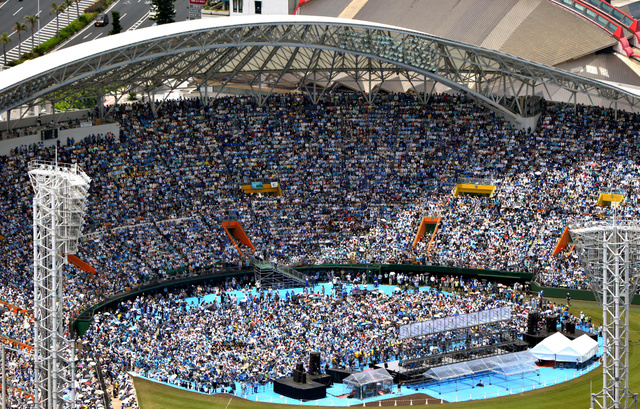
A huge rally against the construction of a new U.S. military base in Henoko, Okinawa was held on May 17 in Naha the capital of the prefecture. Thirty-five thousand participants adopted a resolution to block the construction of the proposed new base and demand the immediate closure of the U.S. Futenma base in Ginowan. The participants demonstrated the popular will of the people of Okinawa to all Japan and the world that they want the U.S. military occupation of their islands to end. Seventy years is enough! The people want mutual development and peace with their neighbours in East Asia. The presence of the U.S. military in the region is the main obstacle to achieving their dream.
Okinawa accounts for 0.6 per cent of Japan's landmass but bears the burden of 74 per cent of U.S. bases. All recent elections have shown broad opposition to the U.S. military occupation. No one can now be elected to any post in Okinawa unless they oppose the U.S. occupation regardless of other policies they may espouse.
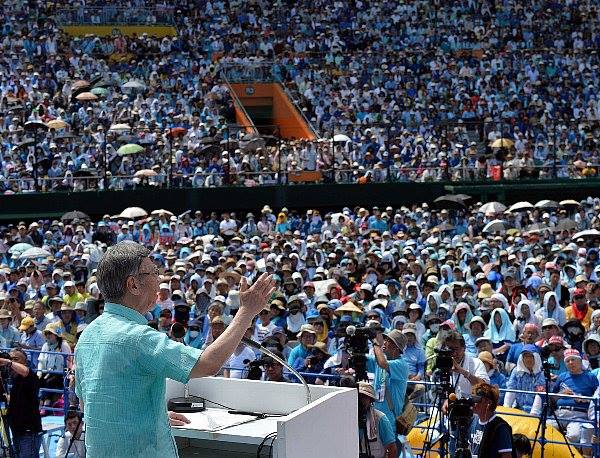 Governor Onaga addresses the rally. |
The people declare that the central Japanese government is acting as a U.S. puppet in forcing yet another base down the throats of Okinawans against their will. Okinawa Governor Onaga Takeshi stated at the rally that in response to the spinelessness of the Abe government in Tokyo and its refusal to follow the wishes of the people, the only issue has become to mobilize the people to block the construction of the base at Henoko.
This third major rally marked a surge in support for the All-Okinawan Movement against the U.S. occupation. Well before the rally began, people from throughout Okinawa flowed into the stadium quickly filling all available seats while thousands more gathered outside. Participants held signs saying, No Henoko Base!, We will not yield!, No U.S. military base! and others.
The youth of Okinawa were prominent amongst the demonstrators including college and high school students and young workers. Youth and student groups opposed to the U.S. military occupation have recently expanded in numbers throughout Okinawa and participate in regular mass actions and discussions. "It is important that each one of us in the younger generation learn, think and take action, even if only a little," said Tomomi Furugen, a senior at Okinawa International University in Ginowan in her speech to the rally representing the voice of Okinawa's students.
Nago City Mayor Inamine Susumu, where Henoko is located, gave a rousing speech pointing out, "Our anti-base struggle is seeping into the hearts and minds of people across Japan and is gaining support from people all over the world."
A co-head of the rally organizing committee Nakayama Kiku in her address forcefully raised the necessity for a Tokyo anti-war government saying, "The presence of military bases is not only directly related to wars but also is a prime example of a violation of human rights." Nakayama was a senior high school student and nurse during the U.S. massacre of Okinawan civilians and pitiless destruction of their mostly defenceless main island in 1945.
In his speech to the packed crowd, Governor Onaga reiterated his determination to stop construction of the new base in Henoko using every means available. He criticized the Abe central government for betraying the people saying, "This is a corruption of Japanese politics. I don't know how the country will be able to share a similar set of values with other leaders in the world, without guaranteeing freedom, human rights and the values of democracy for its own people [...] Prime Minister Abe says he champions the idea of 'regaining Japan,' but is Okinawa included? How many more years will Okinawa have to be sacrificed?" The Governor called on participants to step up efforts to oppose the construction at Henoko concluding his speech with the phrase in the Shimakutuba (Okinawan language), "Do not neglect the Okinawa people!" The crowd responded with roars and a standing ovation.
A resolution calling for the immediate closure and
removal of the hated
U.S. military Futenma base in Ginowan and halt to the construction at
Henoko
was approved with thunderous applause. The rally organizers
representing
parties in the prefectural assembly, leaders of the business community,
citizen
and workers' groups will formally present the resolution at the Prime
Minister's Office, the Foreign Ministry, the Defense Ministry and U.S.
Embassy in Tokyo on May 25. Nago Mayor Susumu Inamine and Chokei
Taira, co-leader of the Shimagurumi-kaigi (All-Islands Conference) will
visit
the United States with Governor Onaga from May 27.
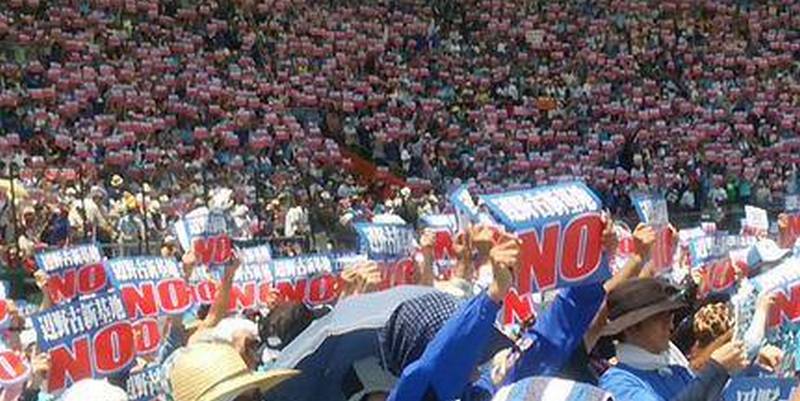
(Ryukyu Shimpo, Asahi Shimbun, Japan Press Weekly. Photos: Asahi Shimbun, Japan Press Weekly, T. Nakamura)
35th Anniversary of People's Uprising in Gwangju, Korea
Gwangju and the Fight for Democracy, Reunification and Freedom from U.S. Occupation
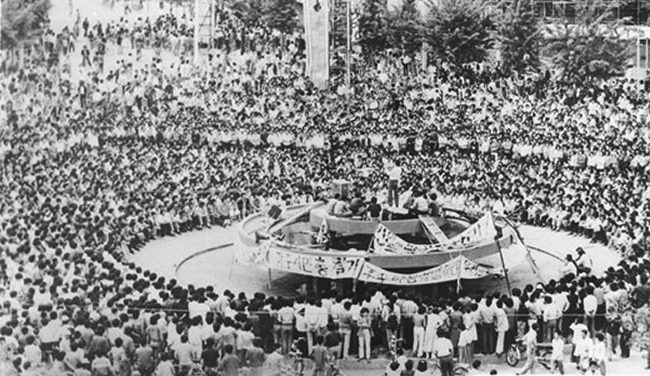
One of the popular rallies that marked the democratic uprising in Gwangju, Korea, May 1980.
May 18 marks the 35th anniversary of the heroic Gwangju People's Uprising which took place in the city of Gwangju, south Korea, from May 18-28, 1980. This important anniversary is being commemorated in Korea in the context of stepping up the struggle against U.S. military occupation of south Korea and to advance the people's movement in south Korea for democracy and reunification.
The Gwangju People's Uprising was a glorious
revolutionary action
undertaken to oppose the brutal military dictatorship of General Chun
Doo-hwan. Chun had come to power through a U.S.-engineered military
coup
that overthrew the government Choi Kyu-hah, who was acting President
following the assassination of military dictator Park Chung-hee in 1979
by the
Korean Central Intelligence Agency. Martial law, which had been imposed
in
parts of south Korea following Park's assassination, was expanded to
the entire
country on May 17, 1980, with provisions added to specifically close
universities, ban political activities and limit freedom of the press.
According to various news and eyewitness reports, the Gwangju People's Uprising was triggered by student demonstrations on the morning of May 18 in defiance of the expanded martial law that sought to crush political dissent amongst the students. The police, however,were unable to check the organized resistance of the people so the Korean Army brought in a special forces unit trained for assault missions to smash the uprising. The special forces unit used tear gas, batons and rubber bullets to try to suppress the student uprising, but workers, shopkeepers and parents took to the streets to defend their children. Then the military opened fire, killing close to 200 people and wounding hundreds more.
On May 20, some 10,000 people demonstrated in Gwangju.
Due to the
widespread militarization of the society, most major workplaces in
south Korea
had caches of weapons. Protestors seized these weapons along with
buses,
taxis, and even armoured personnel carriers, forming armed militias to
fight
the army. On May 21, the special forces were forced to withdraw and the
city
was taken over by the citizens.
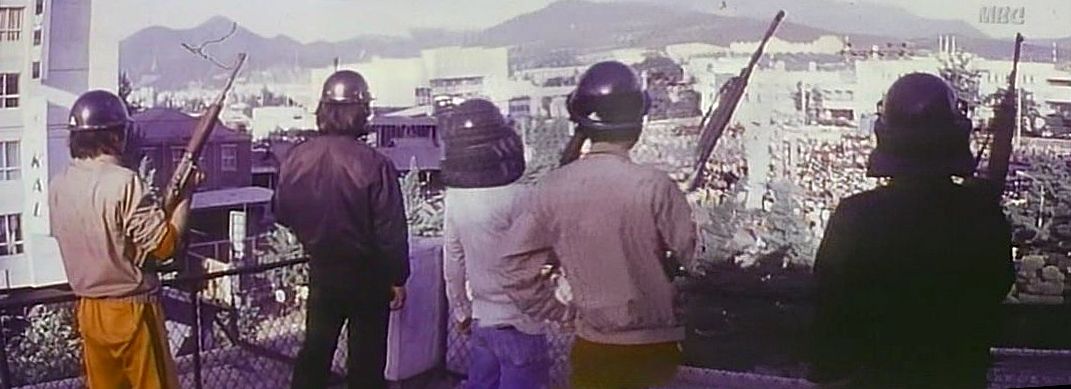
Residents of Gwangju take up arms to defend their rights.
The next five days were a manifestation of the people affirming their rights and exercising control over their circumstances. In the same way in which People's Committees took over from the Japanese military occupiers of Korea in 1945 and formed the de facto government, so too the people of Gwangju organized themselves into Citizens' Committees to ensure everyone's well-being and security. Food, medical and transportation systems were organized and lively political discussions took place where the people gathered to discuss their future, their opposition to the U.S. occupation of south Korea and the need to end the military dictatorship.
On May 24, 15,000 people attended a memorial service in
memory of
those who died at the beginning of the uprising at the hands of the
special
forces. A day later, on May 25, about 50,000 people gathered for a
rally in
Gwangju and adopted a resolution calling for the abolition of martial
law and
the release of Kim Dae-jung.[1]
Soon after this, the U.S. government of Jimmy Carter
intervened because
the Gwangju Uprising was seen as a threat to U.S. strategic interests
on the
Korean peninsula and Asia. The U.S. ordered the Chun regime to move
troops
from the De-Militarized Zone (DMZ) separating north and south Korea to
re-occupy Gwangju. On May 27, at 3:30 am, the army swarmed Gwangju in
Operation Fascinating Vacations.
The people of Gwangju courageously resisted this act of state-terror. In the pitched battles against these soldiers under the command of the U.S. military, thousands of civilians were killed and close to 15,000 people were injured. More than 1,500 people were taken into custody and many were tortured and killed. Seven people were executed and 14 received life-sentences for taking a stand against the U.S. sponsored military dictatorship and to demand their rights.
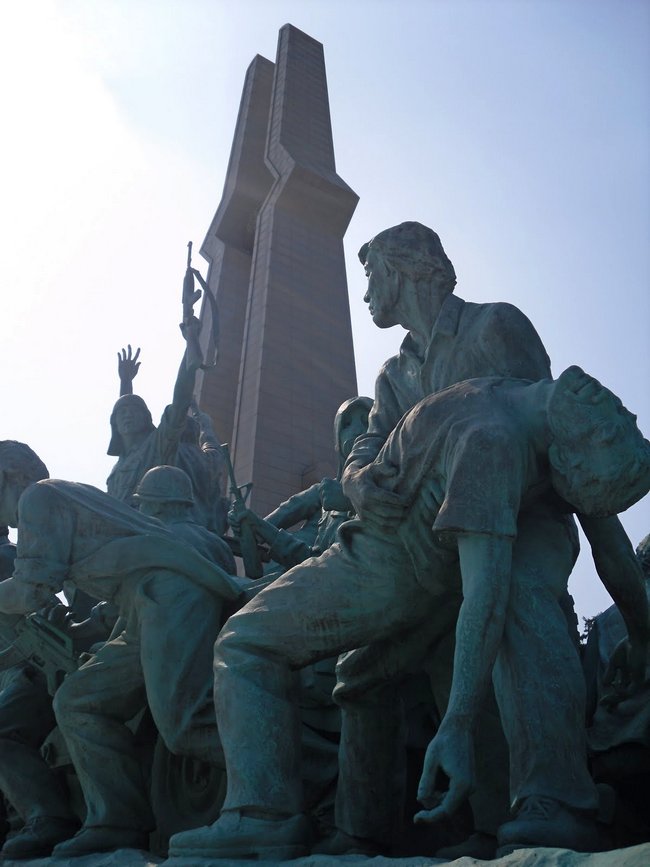 Memorial in Gwangju to those who lost their lives during the uprising. |
While the Gwangju People's Uprising was defeated by this
craven
brutality, the people's bravery left an indelible mark and delivered a
decisive
blow to U.S. imperialism on the Korean peninsula. It signalled a
turning
point in the struggle of the Korean people's collective striving to rid
their
nation of the U.S. military occupation of the south. This occupation
since the
end of the Second World War has brought nothing but misery to the
people
and has stood in the way of instituting democratic reforms in south
Korea as
well as the desire of the Korean people to reunify their divided
country.
The Gwangju People's Uprising today finds expression in the determination of the Korean people south and north to oppose the criminal activities of the U.S.-installed puppet government of President Park Gyeun-Hae in south Korea which shamelessly kowtows before the U.S. imperialists, while at the same time imposing increasingly brutal neo-liberal austerity measures on the south Korean people. Furthermore the Park regime continues to use the 1948 U.S.-imposed anti-communist National Security Law to criminalize and persecute the democratic leadership of the south Korean people. Under these conditions, the 35th anniversary of the heroic Gwangju People's Uprising serves as a beacon to all the fighting forces in Korea as well as in the world who are joined in the struggle to rid the world of U.S. imperialism once and for all.
On the occasion of the 35th anniversary of the Gwangju People's Uprising, TML calls on the working class and people of Canada to intensify their support for the heroic Korean people in their just struggle against the U.S. military occupation of south Korea, to resolutely oppose the U.S. nuclear blackmail and military provocations against the Democratic People's Republic of Korea (DPRK), and to vigorously support the Korean people's 70-year struggle to achieve the independent and peaceful reunification of their divided country. As well, the Harper government must be condemned for its open support of the puppet anti-communist regime in south Korea as well as its anti-communist slanders against the DPRK about "human rights abuses," "gulags" and the like.
All humanity is indebted to the heroic Korean people for playing their role in defeating the Axis powers in the Second World War as well as defeating the U.S./UN forces including Canada during the Korean War to defend their right to independence and peace. It is high time that the U.S. pulls its troops out of south Korea and stops annual nuclear war games aimed at the DPRK. It must normalize relations with the DPRK as it has begun to do with Cuba. This will be much welcomed by the Korean people and peace-loving humanity.
Hail
the
35th
Anniversary
of
the
Heroic
Gwangju
People's
Uprising!
U.S. Troops Out of Korea!
Note
1. Kim Dae-jung, who passed away in August 2009, was at the time of the uprising a well-known political prisoner. He would later become the eighth President of the Republic of Korea and play a significant role in moving forward the north-south dialogue for the peaceful reunification of Korea. Along with the leader of the Democratic People's Republic of Korea Kim Jong Il, Kim Dae-jung co-signed the historic June 15 North-South Joint Declaration which paved the way for a new period in the struggle for Korean reunification.
Firm Stand Against Provocations by
U.S. Secretary of
State
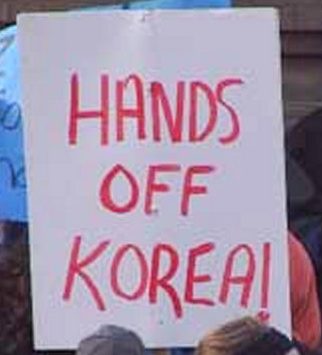 In response to provocative remarks
made against it by
U.S. Secretary of
State John Kerry during a recent visit to south Korea, the Democratic
People's
Republic of Korea (DPRK) stated unequivocally that it would stand firm
on
its principles, defend its right to be and oppose any and all efforts
by
the U.S.
to threaten its security and independence. Furthermore, it pointed out
that
Kerry's comments only reveal the failure of U.S. policy towards the
DPRK
and demonstrate how isolated the U.S. has become with its anti-DPRK
policies.
In response to provocative remarks
made against it by
U.S. Secretary of
State John Kerry during a recent visit to south Korea, the Democratic
People's
Republic of Korea (DPRK) stated unequivocally that it would stand firm
on
its principles, defend its right to be and oppose any and all efforts
by
the U.S.
to threaten its security and independence. Furthermore, it pointed out
that
Kerry's comments only reveal the failure of U.S. policy towards the
DPRK
and demonstrate how isolated the U.S. has become with its anti-DPRK
policies.
At a press conference with south Korean Foreign Minister Yu Byung-se on May 18, Kerry stated that the underwater ballistic missile test successfully conducted by the DPRK on May 9 was in "flagrant disregard for international laws" and that all that the DPRK is doing now "is isolating themselves further and creating greater risks to the region and their own country." Kerry then called for increasing international pressure on the DPRK, once again referencing that country's alleged "human rights" violations.
The DPRK responded in a Foreign Ministry statement on May 20 emphasizing that the testing of the ballistic missile was for defence purposes, which is necessary in light of ongoing U.S. military war preparations and nuclear blackmail against it. The statement notes as well that the Obama administration has to take sole responsibility for sabotaging all possibilities for peaceful and constructive U.S.-DPRK relations. It recalled in particular that in January this year, the DPRK proposed a moratorium on its nuclear testing if the "U.S. temporarily discontinues the provocative joint military exercises against it." This offer was rejected outright and the opportunity to normalize relations, de-escalate tensions on the Korean peninsula and hold fruitful dialogue between the two countries to denuclearize the Korean peninsula was once again lost.
In its Foreign Ministry statement, the DPRK again demanded that the U.S. administration stop these provocations or face the consequences.
Obama's Maxim

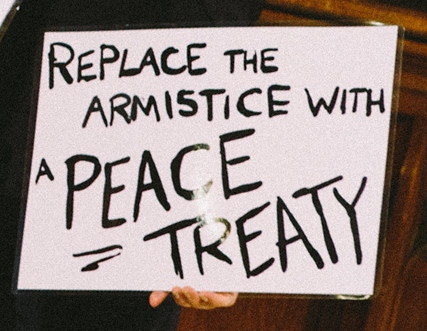
Failure teaches a lot -- this is an axiom that often trips off Obama's tongue.
Then what is the lesson the incumbent U.S. President must learn from his predecessors' unsuccessful tussle with the DPRK over the past 70 years?
Eisenhower's Surrender
On June 25, 1950, the United States unleashed a war against the burgeoning DPRK out of an aggressive ambition to secure a bridgehead for its world supremacy on the Korean peninsula. It enlisted for the Korean front a colossal two million-strong force including the mercenaries of its 15 satellite countries, the south Korean troops and the remnants of the former Japanese army, to say nothing of its own army, navy and air forces. However, it lost one battle after another on the front line. Truman drank a bitter cup and left the White House.
Inaugurated in early 1953, Eisenhower initiated a new offensive to turn the tide of the war. This last-ditch venture, too, ended in a fiasco.
On July 27, 1953 the United States signed the Armistice Agreement, which was tantamount to a letter of surrender. In a radio speech, 59 minutes after the signing of the truce, Eisenhower described it as tragic and heartrending.
Johnson's Apology
On January 23, 1968, the U.S. armed spy ship Pueblo was captured in the act of committing espionage in the territorial waters of the DPRK.
The then-U.S. President Johnson called a meeting of the National Security Council at the White House, in which he dubbed the capture of the vessel an act of war against the United States. He ordered that a huge task force led by the nuclear aircraft carrier Enterprise be dispatched to the waters off the Korean peninsula.
The United States issued an ultimatum to repatriate the
vessel and its crew,
or it would retaliate. The DPRK responded by declaring that it would
retaliate
against the "retaliation" and the "all-out war" in kind. The superpower
had no
option but to admit its criminal action and sign a letter of apology.
Johnson
called it the singular apology in America's history.
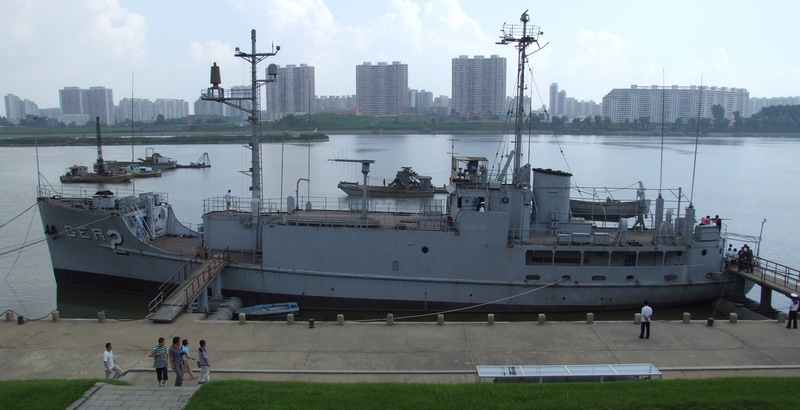
The spyship USS Pueblo, now permanently moored on the Taedong River in Pyongyang.
Bush's "Feat"
Upon taking office in early 2001, Bush labelled the DPRK as part of the Axis of Evil and nullified the DPRK-USA Agreed Framework [on nuclear energy and for the normalization of relations] that had been signed during his predecessor's term. His administration went to extremes in pressuring the DPRK politically, economically and militarily, and openly threatened preemptive nuclear strikes against it.
Bush accomplished a remarkable "feat" by orchestrating a new uproar on the nuclear issue. In the face of the United States' ever-increasing nuclear threat, the DPRK declared that it could possess a nuclear deterrent or something else more powerful to defend its sovereignty and dignity.
And soon afterwards the DPRK carried out a successful nuclear test to affirm that the declaration was not a bluff.
Conclusively speaking, Bush wielded the stick of the sole superpower, only to help the DPRK become a nuclear state.
Lesson for Obama
While running for the presidency, Obama used to clamour about the "recourse to diplomacy" in improving relations with the DPRK, as he might have realized from the lesson taught by his predecessors that a punitive or confrontational policy will not lead to progress.
But it turned out to be just a gimmick. Upon entering the White House, Obama adopted a policy of "strategic patience," which was not designed to improve its relations with the DPRK.
The former Deputy Secretary of State, who was an active protagonist of this policy in the Obama administration, admitted that Obama could find no other alternative to debilitate the DPRK than by destroying its self-defensive nuclear deterrent.
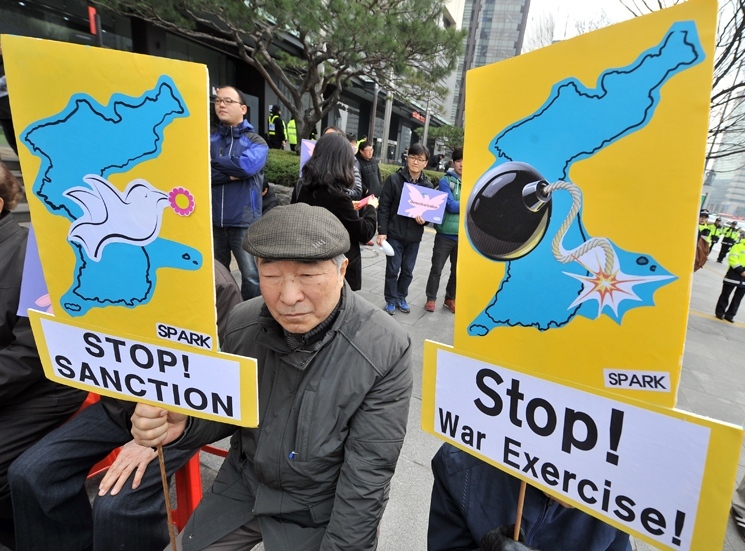 The DPRK judged that in a
major shift of policy the
United States was
scheming to buy time and there was no change in its ultimate goal to
topple
the government. It announced that it would simultaneously conduct
economic
construction and build up nuclear forces.
The DPRK judged that in a
major shift of policy the
United States was
scheming to buy time and there was no change in its ultimate goal to
topple
the government. It announced that it would simultaneously conduct
economic
construction and build up nuclear forces.
American hardliners asserted that Obama's "strategic patience" afforded the DPRK an opportunity to develop its rocket technology and manufacture miniaturized nuclear warheads, further threatening the security of the United States. Against this background Obama has returned to the tough stand towards the DPRK, spearheading an outcry about "human rights" against it.
Recently, Obama was driven into a tight corner by his scandalous act of golfing in Hawaii while the domestic situation plunged into a chaotic mess because of [the protests against] rampant racial discrimination from the end of last year to the beginning of this year. He again provoked the DPRK by issuing a "presidential executive order" aimed at imposing additional sanctions upon it.
The DPRK declared that is is through with the United States and will take counter-measures to end the U.S. provocations.
What then should Obama learn from the seven decades of his predecessors' high-handedness and from his own ineffectual policy? Failure teaches a lot and will teach him a bitter lesson.
(April 20, 2015. Slightly edited for grammar by TML.)
Read The Marxist-Leninist Daily
Website: www.cpcml.ca
Email: editor@cpcml.ca
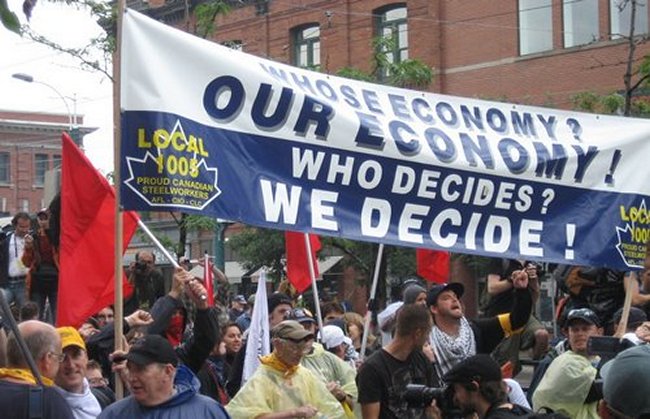 The annexation of Canada
into an aggressive U.S.-dominated Fortress
North America where any pretense of sovereignty has been lost and
private
monopoly interests exercise control over the country's internal and
external
affairs has plunged the country into an existential crisis.
The annexation of Canada
into an aggressive U.S.-dominated Fortress
North America where any pretense of sovereignty has been lost and
private
monopoly interests exercise control over the country's internal and
external
affairs has plunged the country into an existential crisis.

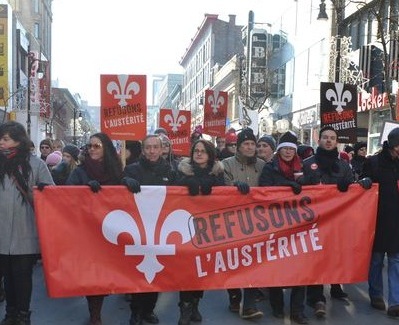
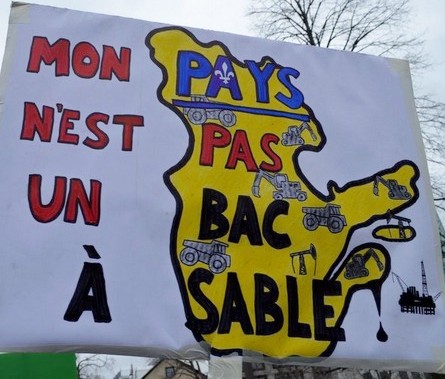 He elaborated on the importance of
the fight against the
adverse affects of
climate change and a plan to reduce green house gas (GHG) emissions,
emphasizing the important role of the provinces in establishing a
system of
carbon pricing to "reduce emissions and accelerate the transition to a
low
carbon economy" for the whole country. This issue has been on the
agenda
of the Council of Federations for years without any agreement because
the
premiers have insisted on representing competing monopoly interests
instead
of representing the needs of the people.[1]
He elaborated on the importance of
the fight against the
adverse affects of
climate change and a plan to reduce green house gas (GHG) emissions,
emphasizing the important role of the provinces in establishing a
system of
carbon pricing to "reduce emissions and accelerate the transition to a
low
carbon economy" for the whole country. This issue has been on the
agenda
of the Council of Federations for years without any agreement because
the
premiers have insisted on representing competing monopoly interests
instead
of representing the needs of the people.[1] The contradictions
among the provincial premiers
and with the
federal government have nothing to do with presenting a new vision of
Canadian federalism suitable for a modern society, but have everything
to do with
representing contending monopoly interests in the U.S., and integrating
the
Canadian economy behind U.S. imperialist interests at home and wars of
aggression abroad.
The contradictions
among the provincial premiers
and with the
federal government have nothing to do with presenting a new vision of
Canadian federalism suitable for a modern society, but have everything
to do with
representing contending monopoly interests in the U.S., and integrating
the
Canadian economy behind U.S. imperialist interests at home and wars of
aggression abroad.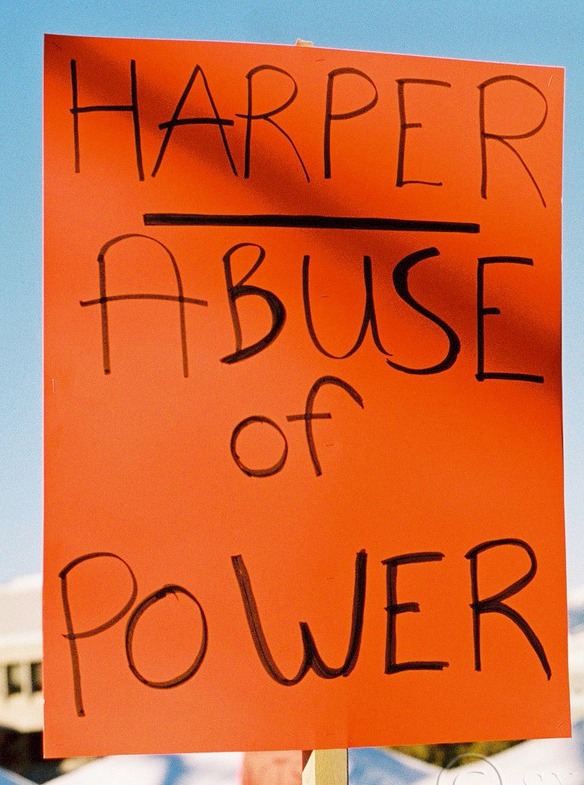 The house of cards on which
the Harper Dictatorship has erected its
monstrous project "Memorial to the Victims of Communism" in Ottawa is
falling fast. Every week, the self-serving tales spun by Prime Minister
Stephen
Harper and his anti-communist lieutenants, Ministers Jason Kenney and
Pierre
Poilievre, dissolve before their very eyes. It has become increasingly
evident
that, as CPC(M-L) said at the outset, it is not a memorial to victims
of
"totalitarian regimes" but an anti-communist glorification of Nazism.
This explains
why the proposed monument and Tribute to Liberty, the private
organization
created to promote it, take up the rallying cry of the Hitlerites and
their
appeasers to defeat communism no matter what the cost. Meanwhile, the
fact
that Prime Minister Stephen Harper and his government remain silent
about
the millions of victims of fascism, and promote Nazis and Nazi
collaborators
as freedom fighters because they fought the communists, has become
increasingly evident as well.
The house of cards on which
the Harper Dictatorship has erected its
monstrous project "Memorial to the Victims of Communism" in Ottawa is
falling fast. Every week, the self-serving tales spun by Prime Minister
Stephen
Harper and his anti-communist lieutenants, Ministers Jason Kenney and
Pierre
Poilievre, dissolve before their very eyes. It has become increasingly
evident
that, as CPC(M-L) said at the outset, it is not a memorial to victims
of
"totalitarian regimes" but an anti-communist glorification of Nazism.
This explains
why the proposed monument and Tribute to Liberty, the private
organization
created to promote it, take up the rallying cry of the Hitlerites and
their
appeasers to defeat communism no matter what the cost. Meanwhile, the
fact
that Prime Minister Stephen Harper and his government remain silent
about
the millions of victims of fascism, and promote Nazis and Nazi
collaborators
as freedom fighters because they fought the communists, has become
increasingly evident as well.